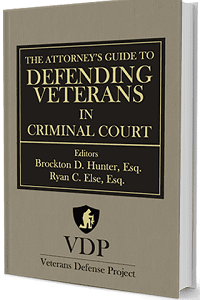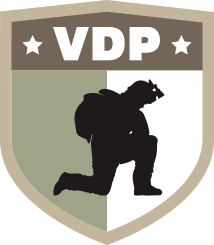Local Leader Spotlight: Brock Hunter, Founder, Veterans Defense Project
 Thursday, April 15, 2021 at 5:49AM |
Thursday, April 15, 2021 at 5:49AM |  Becky Fillinger |
Becky Fillinger | Article by Becky Fillinger
 Brock HunterHow do we best serve our military veterans who find themselves in Minnesota criminal courts? Sometimes we need to adopt a holistic approach to provide the appropriate services and supports called for in the situation. Meet Brock Hunter, Founder of the Veterans Defense Project, who is helping on a national and local level, to provide veterans the support they need.
Brock HunterHow do we best serve our military veterans who find themselves in Minnesota criminal courts? Sometimes we need to adopt a holistic approach to provide the appropriate services and supports called for in the situation. Meet Brock Hunter, Founder of the Veterans Defense Project, who is helping on a national and local level, to provide veterans the support they need.
Q: Why is Veterans Court important to you?
A: My interest in veterans in the criminal justice system originates with my own military service overseas as an Army scout. I returned home and experienced some difficulties reintegrating back into civilian life and for a period of time I acted out in ways that could have led to criminal convictions. I was ultimately able to reintegrate and find new purpose in my life while going to college and law school. After law school, while working as a public defender in the Minnesota courts in the late 1990s, I recognized the large number of veterans coming through the criminal justice system. At the time, they were mostly Vietnam veterans, many of whom had been cycling through the criminal courts regularly since they had come home from Vietnam.
With the terror attacks on 9/11/2001, we went to war again and are still at war 20 years later. Over the course of the last two decades, I have witnessed more and more veterans of these current conflicts flowing into the criminal justice system, just as their Vietnam predecessors did. This generation is unique, however, from other previous generations of veterans. Without a draft, we have fought what have now become our longest wars with small all-volunteer military force, recycling the same troops back into combat over and over again to an unprecedented degree. These multiple deployments translate into higher levels of PTSD and related conditions, which, untreated often lead to veterans to act out against the very communities they risked their lives to protect and land them in the criminal justice system.
Q: Please tell us about the Veterans Defense Project.
A: The Veterans Defense Project is a public policy advocacy and education organization dedicated to helping the criminal justice system do a better job this time around than it did with past generations of veterans. The VDP arose out of my frustrations in defending my veteran clients in the criminal courts. The justice system, as an institution, lacked understanding of the issues that drive combat veterans to criminal behavior or how to best address those issues to break the cycle of recidivism and help restore veterans as assets to their communities, rather than ongoing liabilities.
 Around 2005 I began doing educational presentations to criminal justice professionals and then in 2007 I helped draft and pass Minnesota's veterans sentencing statute, MN Stat. 609.115, Subd. 10, which was only the second such law in the country. The following year the U.S. Supreme Court cited our law in a landmark case, Porter v. McCollum, the first time our highest court addressed the relevance of combat trauma in criminal sentencing. In the wake of the Porter decision, those of us that worked to pass Minnesota's legislation were contacted by advocates across the country who were interested in pursuing similar legislation in their own states. In the years since, we founded the Veterans Defense Project and have helped a number states draft veterans sentencing legislation, published a book Defending Veterans in Criminal Court, been invited to brief policy makers, from the Obama and Trump administrations, to the leadership of the Department of Defense and Department of Veterans Affairs, and trained thousands of judges, attorneys and other criminal justice professionals.
Around 2005 I began doing educational presentations to criminal justice professionals and then in 2007 I helped draft and pass Minnesota's veterans sentencing statute, MN Stat. 609.115, Subd. 10, which was only the second such law in the country. The following year the U.S. Supreme Court cited our law in a landmark case, Porter v. McCollum, the first time our highest court addressed the relevance of combat trauma in criminal sentencing. In the wake of the Porter decision, those of us that worked to pass Minnesota's legislation were contacted by advocates across the country who were interested in pursuing similar legislation in their own states. In the years since, we founded the Veterans Defense Project and have helped a number states draft veterans sentencing legislation, published a book Defending Veterans in Criminal Court, been invited to brief policy makers, from the Obama and Trump administrations, to the leadership of the Department of Defense and Department of Veterans Affairs, and trained thousands of judges, attorneys and other criminal justice professionals.
Veterans Treatment Courts are a product of the evolution of this approach. They are modeled on other specialty courts, like drug courts and mental health courts that have been around for three decades, or so. The philosophy of these courts is to serve as an intervention tool for offenders whose criminal conduct was driven by underlying mental health and/or substance abuse issues by working to treat those issues, rather than just punishing the symptoms. When done right, the offenders are incentivized to undertake challenging treatments and to be held accountable while they get their center of gravity back beneath them, get back on their feet, and get moving forward in life. The Veterans Defense Project helped establish the first Veterans Treatment Court, in Hennepin County, in 2010. We worked with other counties in the Metro area to establish courts over the next few years. Today, there are more than a dozen formal Veterans Treatment Courts across Minnesota. Some of them, in rural areas, serve multiple surrounding counties.
Q: What is happening with veterans’ sentencing in Minnesota?
A: The Veterans Defense Project's current priority is passage of the Veterans Restorative Justice Act (VRJA), an updated "Version 2.0" of Minnesota's original decade-old veterans sentencing statute. This bill is currently making its way through the Minnesota legislature and it addresses key issues that will help improve and standardize our State's Veterans Courts and expand access to veterans in all Minnesota jurisdictions.
Though not yet passed in Minnesota, VRJA has already garnered significant interest on a national level. The Veterans Defense Project was invited to help brief the Trump Administration and key members of Congress last year to support passage of the Veteran Court Coordination Act, which was signed into law in the fall of 2020. This new federal law provides for significant additional funding for Veterans Treatment Courts across the country. The Department of Justice will administer the funds and will likely require that states adopt standards based on the VRJA to access them. Groups in several states, including Virginia, Florida, Texas, Iowa, and Nebraska have expressed interest in the VRJA and are moving forward with introducing similar bills in their own legislatures.
 Q: How can we help?
Q: How can we help?
A: We encourage those who support the passage of the VRJA in Minnesota to contact your legislators and encourage them to pass it, ensuring Minnesota remains at the forefront of doing better by our veterans, ensuring they are reintegrated as assets, rather than ongoing liabilities, to the communities they once served to protect.
Q: Thank you for this important work. How may we follow your news?
A: Please do! Readers can learn more about the Veterans Defense Project at our Facebook page and at our web site, veteransdefenseproject.org.
